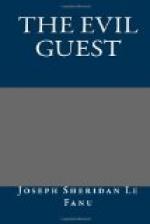“Mr. Marston,” said Mervyn, rising, and thrusting his hands into his pockets, while he confronted him to the full as sternly, “the country knows in which of our hearts the spite, if any there be between us, is harbored. I owe you no friendship, but, sir, I cherish no malice, either; and against the worst enemy I have on earth I am incapable of perverting an opportunity like this, and inflicting pain, under the pretence of discharging a duty.”
Marston was on the point of retorting, but the coroner interposed, and besought them to confine their attention strictly to the solemn inquiry which they were summoned together to prosecute.
There remained still to be examined the surgeon who had accompanied the coroner, for the purpose of reporting upon the extent and nature of the injuries discoverable upon the person of the deceased. He, accordingly, deposed, that having examined the body, he found no less than three deep wounds, inflicted with some sharp instrument; two of them had actually penetrated the heart, and were, of course, supposed to cause instant death. Besides these, there were two contusions, one upon the back of the head, the other upon the forehead, with a slight abrasion of the eyebrow. There was a large lock of hair torn out by the roots at the front of the head, and the palm and fingers of the right hand were cut. This evidence having been taken, the jury once more repaired to the chamber where the body lay, and proceeded with much minuteness to examine the room, with a view to ascertain, if possible, more particularly the exact circumstances of the murder.
The result of this elaborate scrutiny was as follows:—The deceased, they conjectured, had fallen asleep in his easy chair, and, while he was unconscious, the murderer had stolen into the room, and, before attacking his victim, had secured the bedroom-door upon the inside. This was argued from the non-discovery of blood upon the handle, or any other part of the door. It was supposed that he had then approached Sir Wynston, with the view either of robbing, or of murdering him while he slept, and that the deceased had awakened just after he had reached him; that a brief and desperate struggle had ensued, in which the assailant had struck his victim with his fist upon the forehead, and having stunned him, had hurriedly clutched him by the hair, and stabbed him with the dagger, which lay close by upon the chimneypiece, forcing his head violently against the back of the chair. This part of the conjecture was supported by the circumstance of there being discovered a lock of hair upon the ground at the spot, and a good deal of blood. The carpet, too, was tumbled, and a water-decanter, which had stood upon the table close by, was lying in fragments upon the floor. It was supposed that the murderer had then dragged the half-lifeless body to the bed, where, having substituted the knife, which he had probably brought to the room in the same pocket from




